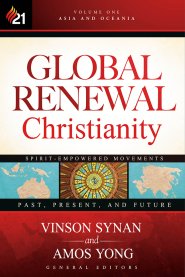Pentecostal Theological Education: Indonesia
PneumaReview.com: What changes are taking place in Pentecostal theological education in Indonesia?
Ekaputra Tupamahu: Everything that exists in history will undergo changes, and this is true also with Pentecostal theological education in Indonesia. There are some areas of change, among others, that I can highlight here. First, many of these schools no longer depend on foreign financial support. Second, some of the professors are beginning to think outside of the box of American theological discourse. For example, Christ is no longer seen only from an American perspective. Gani Wiyono, one of the theology professors at Sekolah Tinggi Teologi Satyabhakti, published an article in the Asian Journal of Pentecostal Studies some years ago arguing that Christ can also be understood from the perspective of the Javanese expectation of Ratu Adil. This Javanese picture of Christ, I would say, is a (re)turn towards the Indonesianization of Pentecostal theological discourse. Third, some Bible school leaders are now actively engaging in inter-denominational and inter-religious dialogues both in formal and informal settings. This ecumenical attitude was not really apparent in the earlier stages of the history of these schools.
PneumaReview.com: Are there additional changes that you think need to take place?
Ekaputra Tupamahu: There are two changes that I think need to take place in the future. First, Indonesian Pentecostal schools need to be more serious with the development of their academic scholarly quality. This is crucial because the society has changed today. Indonesian government, for instance, demands every school to get serious academically. The faculties are required to publish their works. The library collection has to meet a certain acceptable standard for accreditation. If schools are not serious academically, their right to grant degrees could be revoked and the consequence is devastating. The way of conducting theological education 50 years ago might not be relevant anymore today. By being serious with scholarship, Pentecostal theological schools in Indonesia do not just help fulfill their role to produce religious workers, but to serve the larger segment of society as well. Pentecostal leaders need to be trained rigorously so that they can both minister effectively and engage the society in a meaningful way.
The second change is related with the first one. It is about time for Pentecostal theological education to push itself beyond the box of “theology” as a field of study. Since knowledge is always complex, theology and theological education has to reflect this character of multidimensionality. It is no longer relevant for Pentecostal theological education to operate in isolation from other forms of knowledge. I think we should remember that many Pentecostal schools in the US have taken this step to broaden their horizons. They grew from an isolated Bible college into a comprehensive university. Theology, therefore, becomes one of departments in the school and not the only department. That way, students of theology will also have opportunity to take sociology, anthropology, political science, or philosophy classes. Pentecostal theological schools in Indonesia should explore this possibility. There have been some informal conversations about it, but I haven’t seen any serious plan being laid out to make it happen. The implementation of such idea requires not only a political will and commitment from church leaders, but also financial support from Pentecostal churches in Indonesia. I believe that there is so much potential for future improvements.
PR
For Further Reading:
 Ekaputra Tupamahu contributed the chapter, “American Missionaries and Pentecostal Theological Education in Indonesia” in Amos Yong and Vinson Synan, eds., Global Renewal Christianity: Spirit-Empowered Movements Past, Present, and Future, Volume 1: Asia and Oceania (Charisma House, 2015). Preview the book here: https://books.google.com/books?id=SZ8jCQAAQBAJ
Ekaputra Tupamahu contributed the chapter, “American Missionaries and Pentecostal Theological Education in Indonesia” in Amos Yong and Vinson Synan, eds., Global Renewal Christianity: Spirit-Empowered Movements Past, Present, and Future, Volume 1: Asia and Oceania (Charisma House, 2015). Preview the book here: https://books.google.com/books?id=SZ8jCQAAQBAJ
Category: Ministry, Spring 2017


